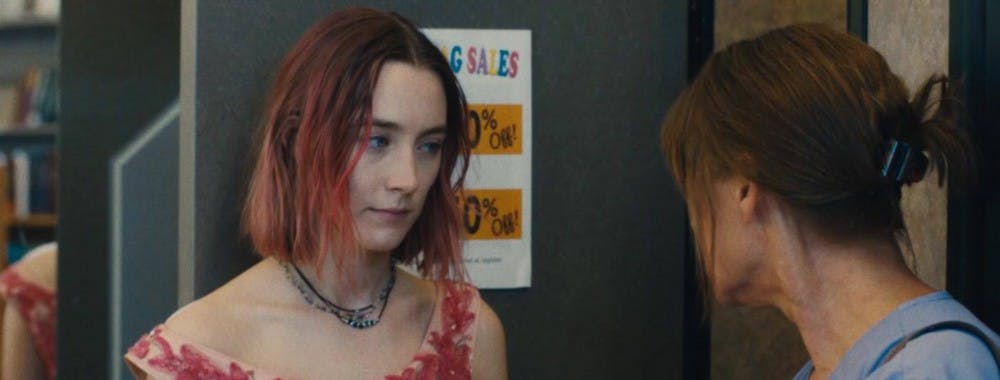Near the end of Greta Gerwig’s recently released “Lady Bird,” the film’s heroine Christine “Lady Bird” McPherson (Saoirse Ronan) passes her driver’s license test and subsequently thanks the man who administered the test.
“It’s not a thanking situation,” the man replies. “You either pass or you don’t.”
In a sense, this interaction expresses in one short scene the major themes of the entire film. Following the title character through her senior year of high school and into the beginning of college, “Lady Bird” is a lesson in passing, failing and gratitude, and the presence of these three in the relationships and experiences of a girl at the tail end of adolescence.
Audiences look on as Lady Bird stumbles through two boyfriends and two best friends, shifting places with Danny, Kyle, Julie and Jenna — played by Lucas Hedges, Timothee Chalamet, Beanie Feldstein and Odeya Rush, respectively — and see her actions and allegiances shift as frequently as these relationships. Remaining constant in the film’s plot is Lady Bird’s turbulent and startlingly authentic relationship with her mother Marion (Laurie Metcalf), and the dynamic nature of the character of Lady Bird herself.
Lady Bird is, in turn, harsh, kind, selfish and generous, but throughout the film she employs a trial-and-error method of living which makes Gerwig’s partly-autobiographical debut more intimate and endearing than many films of its genre. Gone are the rose-colored glasses that burden so many coming-of-age films, and in their place are a pair of spectacles that clarify all of the awkward and painful experiences of growing up as well as the beautiful ones.
Lady Bird passes some tests of character and growth with flying colors, but she fails others just as spectacularly. Lady Bird’s flaws — her outspokenness, her messy, high school style of dressing, her ability to be quite callous — ground a character that could otherwise fade away into the endless canon of filmic manic pixie dream girls.
One of the most honest and full-bodied representations of teenage girlhood to date, Lady Bird is the shining star of what can only be seen as her film. While her relationship with her mother also has a large role in the film, the rebellious high school senior definitely takes center stage, with a host of secondary characters falling into place around her, positioned as unique, slightly underdeveloped, foils to the film’s titular quirky schoolgirl.
Lady Bird’s friends and lovers, her brother and father, her teachers — all are lovable tropes that reflect an attribute of Lady Bird herself, and this isn’t necessarily an imperfection of the film. The film is an ode to both the strengths and weaknesses present in Lady Bird, not romanticizing but, instead, explaining her personal experiences and her actions in a way that makes her the sole focus of viewers.
Lady Bird's larger-than-life personality is more than enough for Gerwig to focus on in terms of direction, and she provides sufficient interest for audiences to stay engaged and amused by the film. However, overwhelming “Lady Bird” through the presence of its leading lady, is its sense of gratitude for life, and for both the passing and the failing that life entails.
Lady Bird is frustrated with her hometown of Sacramento, her family’s lower-middle-class status, her friends and, sometimes, her looks; but she lives her life consciously and thankfully, determined not to miss an opportunity. The film travels breathlessly through what it means to be a teenager, exploring experiences such as prom, falling in love and applying to college with what can only be described as pure joy.
At the end of the film, Lady Bird calls her mother from the university she attends in New York City. She leaves a voicemail for Marion that attempts to heal an ongoing feud between the two. In the message, Lady Bird refers to herself as Christine, using the name her mother gave her instead of her self-proclaimed title of Lady Bird, and she finishes the voicemail by telling her mother thank you.
This thank you is simple and unexplained. Lady Bird doesn’t say why she’s thanking her mother, and we never see her mother’s reaction to the daughter’s expression of gratitude. But, in a way very similar to the scene when Lady Bird receives her driver’s license, these two words finish out the film and explain it perfectly.
Lady Bird is thankful for her mother’s presence. The film is thankful for Lady Bird. And the audience is left feeling thankful as well, both for lives and relationships of their own and for Gerwig’s charming look at a girl who becomes a woman before the credits roll.

